Capital market performance
- The Thai capital market (SET Index) has continued declines over the previous quarter impacted by a weakening outlook. Forecasted GDP growth for the Thai economy is now lower than originally expected. Overall tourist arrivals was adversely affected by the decrease in Chinese tourists; a trend that could indicate structural preference shifts.
- Uncertainties regarding global trade policies are also a key economic headwind. The Monetary Policy Committee (MPC) anticipates GDP growth for 2025 to decline to 2.0% should trade negotiations prolong, and the US import tariffs remain close to the rates currently in place. The MPC has indicated a downside GDP growth scenario of 1.3% if trade tensions were to escalate and US import tariffs were raised even further.
- The Thai baht slightly appreciated against the US dollar from 34.2 in the last quarter to 34.1 as at 31 March 2025, based on BOT’s average selling rates

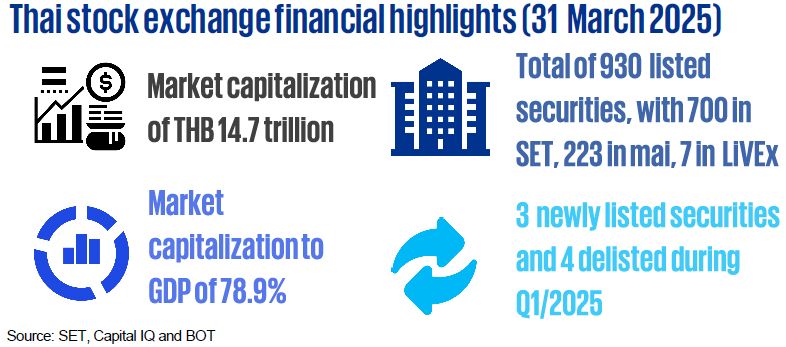
- US federal funds rate: In its May meeting, the Federal Open Market Committee (FOMC) maintained the target range for the federal funds rate at 4.25% – 4.50%. The FOMC announced that it will continue to reduce its holdings of Treasury securities, agency debt and agency mortgage-backed securities.
- Inflation: Headline inflation is forecast to fall below the target range in 2025 and 2026, primarily due to lower global crude oil prices and government subsidies partially offsetting living and business cost increases. Nevertheless, trade protectionism and shifts in global supply chains may impact the future inflation outlook.
- Thai policy interest rate: On 30 April, the MPC voted 5 to 2 to cut the policy rate further from 2.00% to 1.75% in view of the weakening economic outlook.
- Yield and spread: Credit risk spreads for riskier corporate bonds have widened since the previous quarter. Thai government bond yields declined in line with the policy rate.
Source: BOT and Federal Reserve
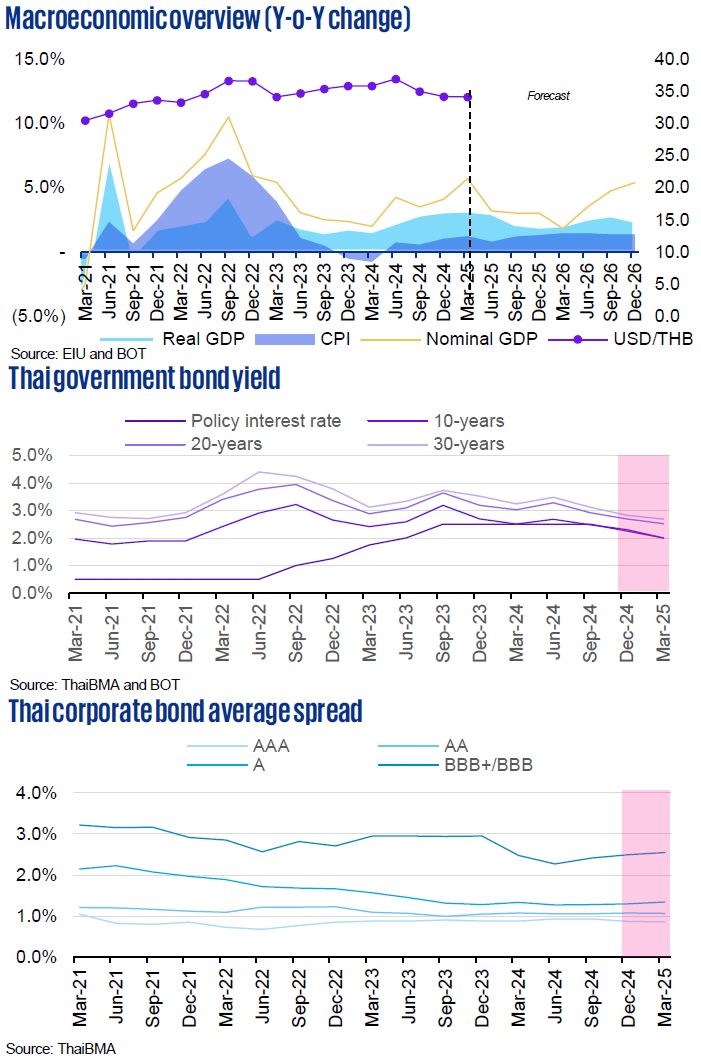
SET valuation metrics by sector (last 5 quarters)
The SET has eight key sector categories for listed entities. The three most-common valuation multiples across 5 quarters in these sectors illustrate movement due to both economic fundamentals and the impact of global events on market sentiment.
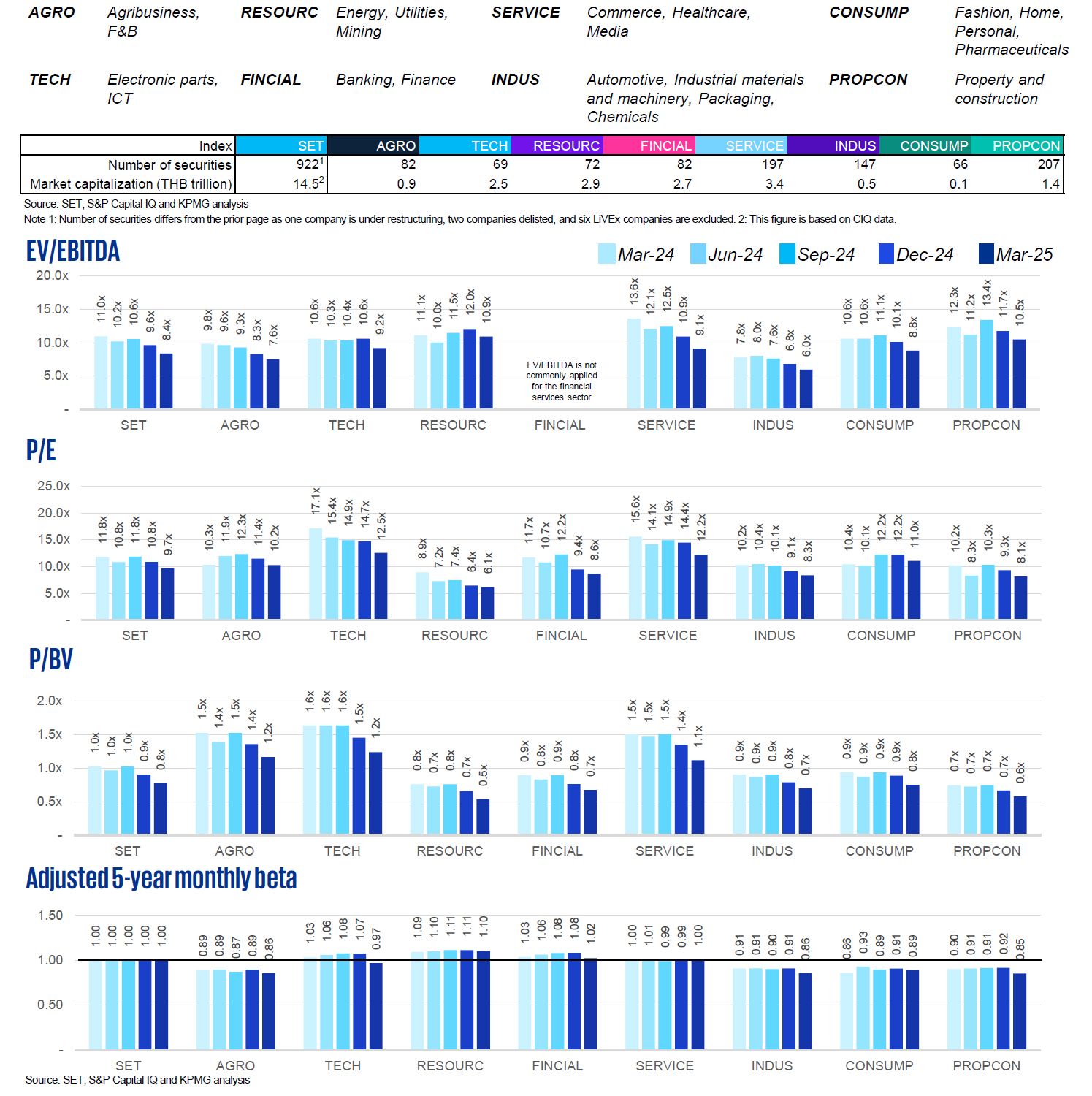
The multiples in Q1/2025 dropped from the previous quarters for all sectors, corresponding with the decline in the overall stock market.
Sector beta represents the undiversified risk of a sector. The higher the beta, the riskier it is for that specific sector. The betas have declined across all sectors, except for SERVICE, where the beta increased.

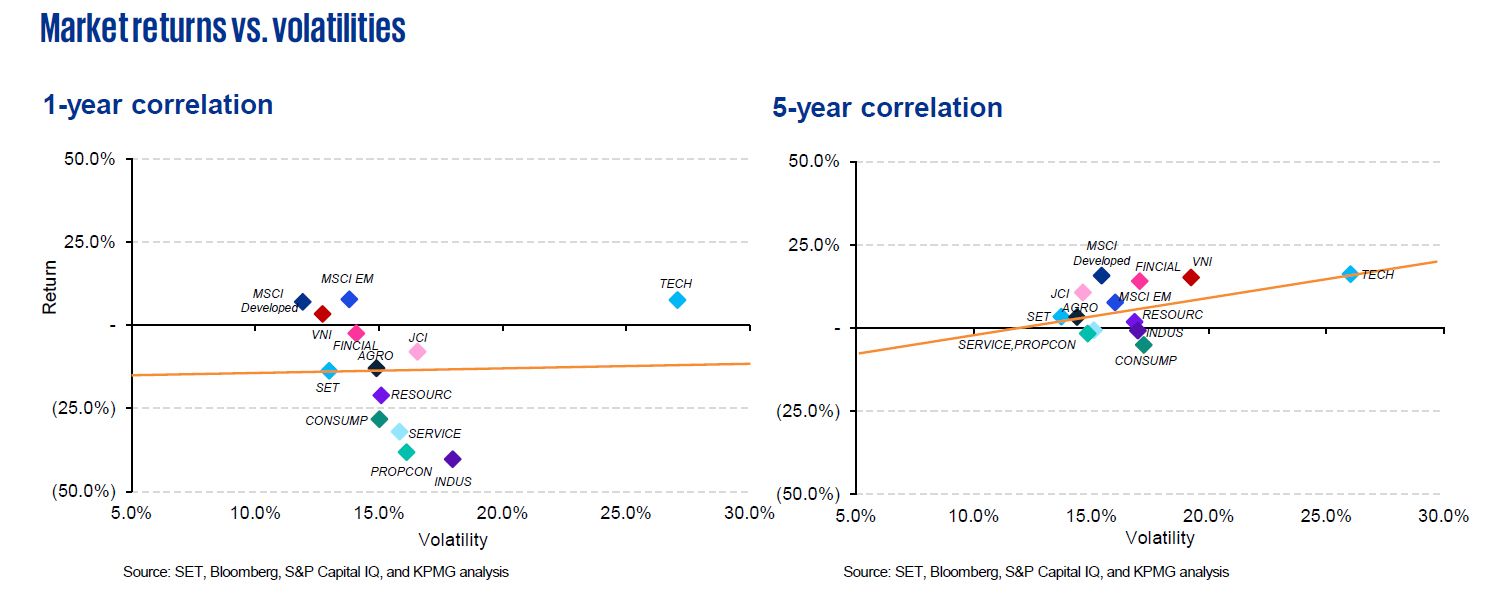
- Throughout the one-year and five-year evaluation periods, the SET has exhibited lower returns than other indices compared. Within Thailand, the TECH sector surpassed all other market sectors in terms of performance during both the one-year and five-year periods. Conversely, the INDUS sector recorded the poorest performance in terms of annualized return over the one-year period.
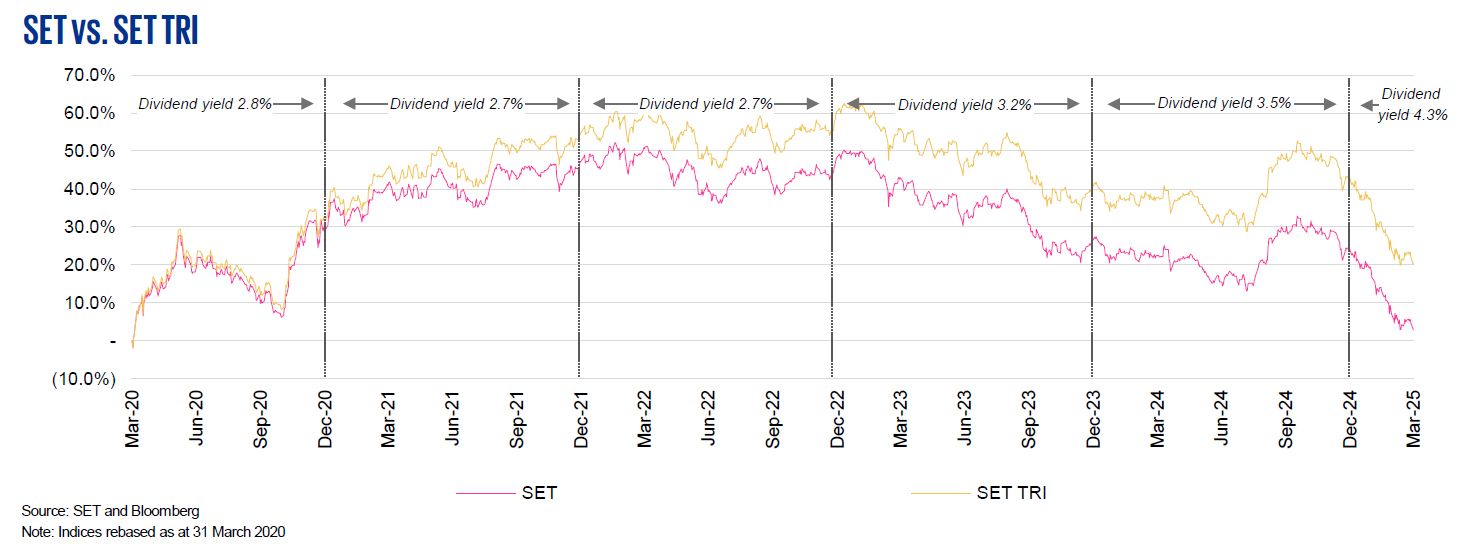
- Total return index (TRI) is an index that measures the total return from investing in securities. It comprises (1) a return arising from the change in value of the securities or “capital gain/loss”, and (2) dividends paid, assuming they are reinvested in the securities.
- The dividend yield for 2025 stands to be the highest, as the overall stock market experienced a decline in the first quarter of this year, ahead of an expected downturn in corporate financial performance.
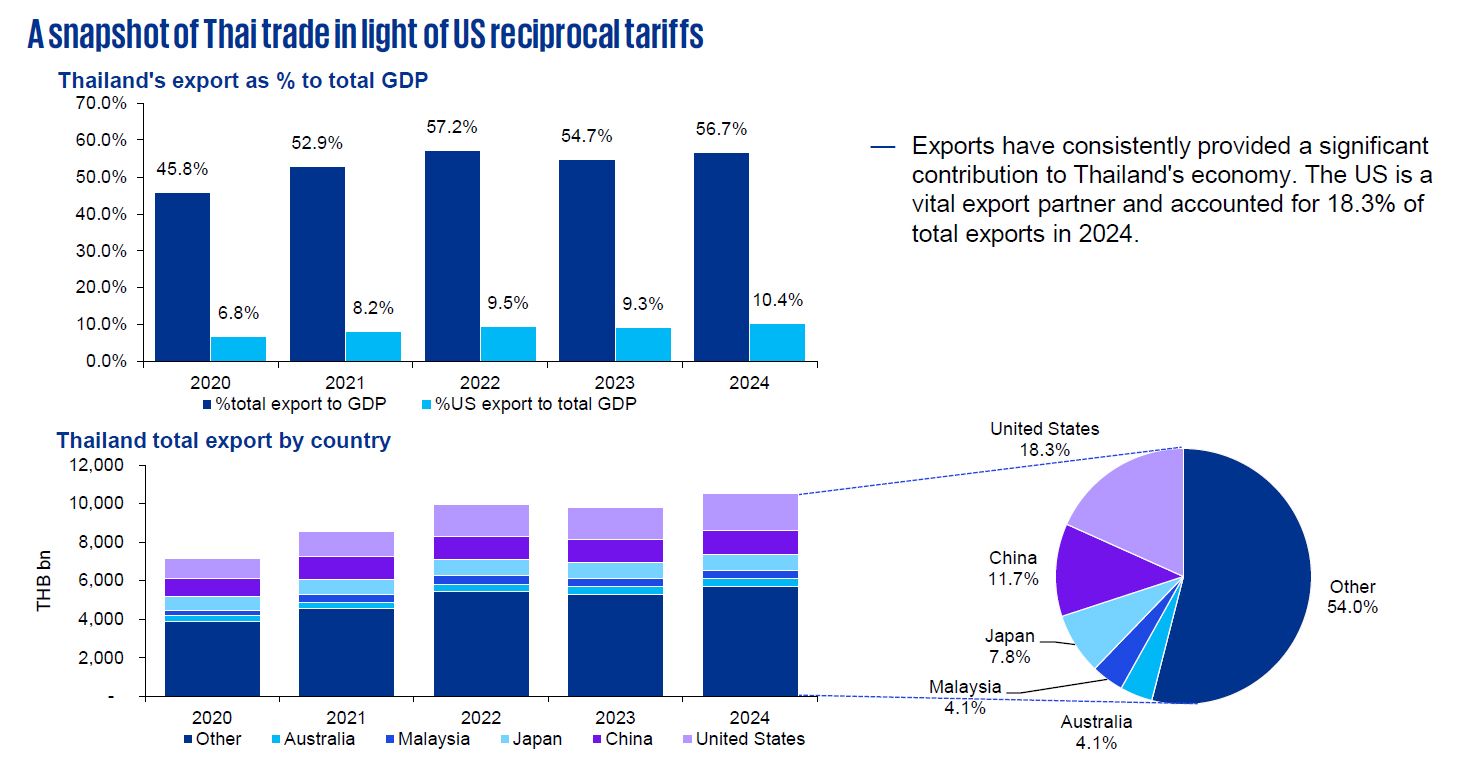
- On 2 April, the US imposed a reciprocal tariff 37.0% on products from Thailand. Given the significance of US market to Thailand's exports and the unpredictability introduced by the newly imposed tariff, Thailand’s economy is highly likely to face a period of uncertainty.
- On 8 May, Pichai Chunhavajira, Thailand's Finance Minister, submitted trade proposals with 5 key areas to the US Trade Representative. Consequently, any future changes to the tariff will depend on the result of further negotiations.

- The top 5 most exported products constituted more than 70.0% of Thailand's total exports to the US in 2024.

- The introduction of the reciprocal tariff policy caused significant market volatility. The SET recovered from intra-month declines in April largely due to the AGRO and TECH sectors.
Data criteria
Thailand valuation multiples by sector
- The SET sector classification serves as the principal criterion for the illustrated sectors.
- The sector valuation multiples and beta are based on the respective median.
- 12-month trailing multiples are derived from Q1/2024 to Q1/2025.
- Q1/2025 multiple is based on the latest available financial statement information as at Q4/2024.
- Data in historical periods may change according to Capital IQ’s retrospective adjustments.
Regression on returns and volatilities
- The total ntrading days per year is umber of assumed to be 252 days.
- The period in the study is 1 April 2020 – 31 March 2025.
SET and SET TRI
- Annual dividend yields are based on dividend yields from Bloomberg.
乐鱼(Leyu)体育官网 Deal Advisory
"乐鱼(Leyu)体育官网 provides a full range of valuation services for all sell-side, buy-side, tax restructuring, fund raising, and joint venture transactions."
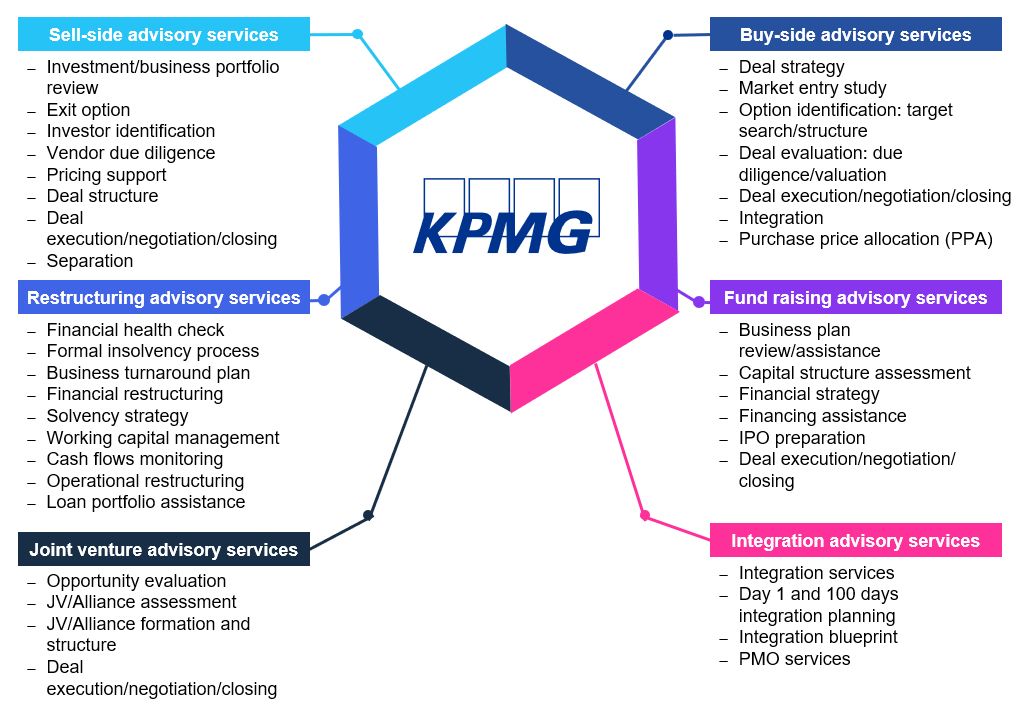
Key contacts
Connect with us
- Find office locations kpmg.findOfficeLocations
- kpmg.emailUs
- Social media @ 乐鱼(Leyu)体育官网 kpmg.socialMedia


